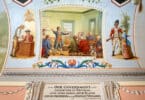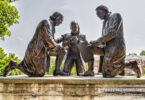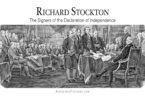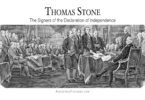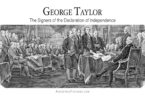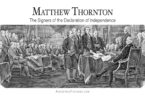James Smith was born in about 1719 in Ireland, then moved to Cheshire County, Pennsylvania with his family when he was between ten and twelve years old. James’s father was a farmer of some success, and this success enabled James to benefit from a good, solid, but simple classical education with the minister of the family’s local church. After this good foundation of education, James studied law at the office of his older brother, George, who kept his own law office in Lancaster, Pennsylvania.
When he was twenty-six years old, James was admitted to the Pennsylvania Bar, whereupon he opened his own law office near Shippensburg in Cumberland County, Pennsylvania. Because this was essentially a frontier area at the time, there was not much law to practice, and James spent much of his time there surveying land instead. While he did practice law sparsely in Cumberland County, he eventually moved to York, Pennsylvania after four or five years in the relative wilderness, so that he would be able to exclusively practice law.
When James was forty-one years old, he married Eleanor Armor, who was the daughter of John Armor of New Castle, Delaware. She was ten years James’s junior. Together, they had five children, only one of whom made it past childhood, married, and had children of her own. Other children of James and Eleanor made it past childhood, but they either did not marry or did marry and did not have children. This child, Mary, had two children who lived past childhood, only one of whom had children of their own, and neither of those children had their own children, so James’s direct line of descent ended after his great-grandchildren.
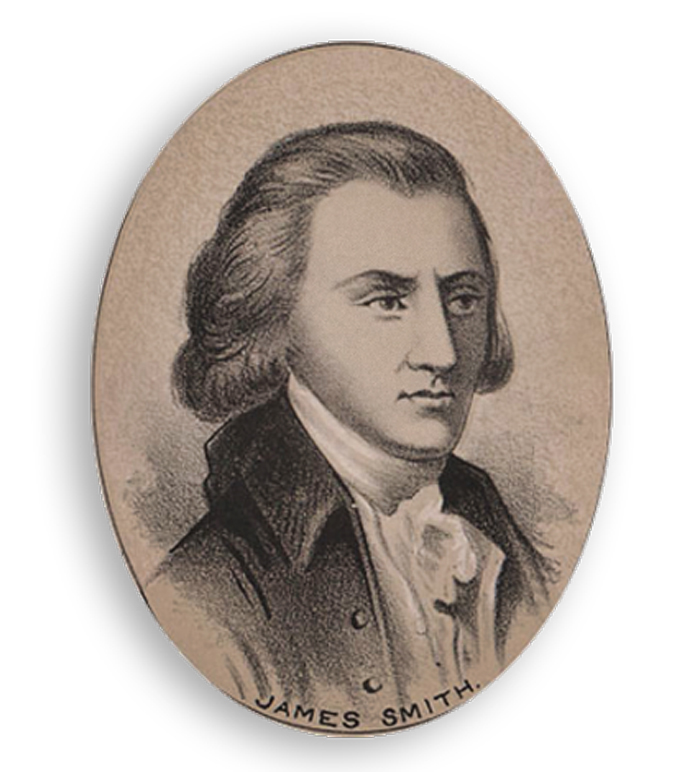
In the early 1760s, James started an iron foundry, but it was not successful. The market for iron was there, but James put the business in the hands of two overseers who were not good at managing the business. In James’s own words, “one of whom was a knave, and the other a fool.” James lost a substantial sum on this business, but it allowed him to become more known by the public in the area in which he lived. This was important in his political career, which was something he began to take interest in when he became concerned in the early 1770s about the obvious rift between the colonies and Great Britain.
James attended a provincial assembly in 1774, where he submitted a paper he had written that was called Essay on the Constitutional Power of Great Britain over the Colonies in America. In the paper, James advocated for the colonies boycotting all goods from Britain. James believed that this technique would hurt British merchants in a financial way, which would push them to demand that Parliament back away from some or all of the oppressive laws they had passed against the colonies. Coincidentally, this is exactly what the First Continental Congress did in the fall of that year.
Also in 1774, James put together a company of volunteer militiamen in York County, Pennsylvania. The volunteers elected him as their Captain. Thanks to the British pressure on American trade and general freedom, the militia soon grew to enough men to be a battalion, and the battalion chose James as its Commander. Because James was fifty-five years old at this time, he deferred his Commander position to a younger man.
In 1775, James was elected as a delegate to the colonial assembly in Philadelphia. At the assembly, he said that
“if the British administration should determine by force to effect a submission to the late arbitrary acts of the British parliament, in such a situation, we hold it our indispensable duty to resist such force, and at every hazard, to defend the rights and liberties of America.”
These were considered strong words at the time, as many colonists at that time in history were hoping for a reconciliation with Great Britain. This was especially true in Pennsylvania, where many of the citizens were Quakers, and therefore hoping for peace instead of conflict.
James made a name for himself as a voice in favor of American independence while in the colonial assembly. After the proposal for independence by Richard Henry Lee at the Second Continental Congress, and especially after the initial skirmish battles at Lexington and Concord, it became clearer that independence was the only answer. This allowed Pennsylvania to appoint a new slate of delegates to the Continental Congress. Among the new ones was James.
As part of the Second Continental Congress, James was able to become a signer of the Declaration of Independence. After the Declaration was signed, James went with Captain Francis Wade and Dr. Young to York with a printed broadside copy of the Declaration to read to the public in the town square. James served for two years on the Continental Congress, and since the Congress was meeting in Philadelphia, which was near James’s office, he offered his office as a place for the Congress’s Board of War to meet.
At the same time, he was serving in Congress, James also continued to serve on Pennsylvania’s colonial assembly. In 1781, James was elected to be a Brigadier General of the Pennsylvania Militia. At this time, he also went back to practicing law at his own law office. James practiced law until 1800 when he retired at age eighty-one.
In addition to his work on the Continental Congress and the Pennsylvania colonial assembly, James also did a short stint as a judge of the state High Court of Appeals, and did one term in the Pennsylvania State Assembly, after it became a state instead of a colony. In 1785, James was elected to the new United States Congress, but declined to serve because of his age, believing he was too old to participate in such things anymore.
Shortly before James crossed over to the other side, a fire destroyed his office and most of his papers with it, so little is known about his actual life today, besides what was recorded by others. James crossed to the other side in July of 1806 in York, Pennsylvania, and is buried in the First Presbyterian Churchyard there.

